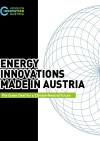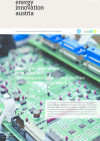Suchergebnisse für "Factsheet: Energietechnologien gestalten, die für alle sinnvoll und nutzbar sind"
Holz-Passivhaus Mühlweg: Eröffnungsfeier
21. Jun 2007
Mühlweg 741210 Wien, AT
Fünfgeschoßiger sozialer Wohnbau in Holz-Mischbauweise
Sustainable Business Planner
Further development of the established management concept business plan to the Sustainable Business Plan. Production, testing and dissemination of the holistic user-oriented IT Tool "Sustainable Business Planner" in the context of an Austrian start-up initiative.
digiactiv - digital transformation for more interactivity in MEP-(mechanical, electrical and plumbing-)planning
The aim of the digiactiv project is to improve the interoperability between the different stakeholders in the building construction sector using open and neutral semantic data models. With digital transformation processes, digiactiv helps to increase the quality of planning and the operation of buildings, as well as to minimize the interface risk between various stakeholders.
Edible Seestadt - Green Seestadt - Learning for the Edible City of the Future
"Edible Seestadt" ("Essbare Seestadt") identifies which contributions an edible city provides for a climate-neutral resilient district and how this contribution can be sustainably stabilized and optimized.
Economical Utilisation of residues from slaughtering and meat processing
By utilising fresh raw materials, the process of producing meat and bone meal can be avoided and products of higher quality may be obtained.
Sustainability Management System - scorecard-based construction of an operative sustainability management
Implementation of a scorecard-based sustainability management system in four enterprises; adaptation of a web-based software for sustainability management and reporting; preparation of the manual "Sustainability Managing Systems" on the basis of the OIN guidelines "Reporting about Sustainability".
SpeedReg - Prompt quality assurance of the commissioning process of buildings
The focus of the project is on quality assurance within the commissioning process with the aim to speed up and to improve the operational adjustment of newly constructed or comprehensively renovated buildings. The fragmented know-how which is hardly accessible for the relevant target groups will be consolidated and elaborated in the form of a practice guideline which will be directly applicable in commissioning processes in practice. In this way the project contributes to the development of a common, well-established standard for quality assurance within the commissioning of buildings.
Investigations on the Fundamental Suitability of Sprayed-on and Plaster-covered hygrothermic active Cellulose-Compact-Soundabsorber

Development of a new kind of spray-on and plastered noise absorber on the basis of cellulose from recycled paper. The absorber system preferably attenuates the low-frequency range, that can usually only be controlled with rather complex systems, and can also be used where conventional absorbers could cause problems due to impermissible water vapour condensation.
Technical status of ventilation systems for buildings

Evaluation of existing ventilation systems in Austria considering technical quality and practicability.
IEA HPP Annex 28: Test procedure and seasonal performance calculation for residential heat pumps
Test procedure and seasonal performance calculation for residential heat pumps with combined space heating and heating of tap water - IEA Heat Pump Program Annex 28
SC_micro-quarters – Planning and modernisation of smart city quarters with a view to energy optimisation and a high quality of life
The SC_micro-quarters project demonstrates possibilities for urban planning and urban quarter development with a view to creating a path to a low carbon city with a high quality of life and good resilience, while taking into account existing and proposed buildings, infrastructures and uses. The central element is the modelling of urban structures at micro-quarter level.
VITALITY District - Optimized energy concepts in the early planning phase of resilient, energy-efficient neighbourhoods
The aim of the VITALITY District project is to coordinate the total (electrical and thermal) load and generation profile in the design phase of urban areas and neighbourhoods in order to optimize the energy concept of energy-efficient districts. Hence smart city indicators in detailed level (buildings, individual technologies, public spaces) as well as models, principles and catalogs of criteria for energy-optimized urban neighbourhoods are going to be created. The results are going to be presented in compact form on the district level in order to serve as input for future urban planning projects.
Energy Innovations made in Austria - The Green Deal for a Climate-Neutral Future

This brochure presents the latest findings in energy research in Austria with examples from cities of tomorrow, decarbonisation of industry, digital transformation and green hydrogen.
Herausgeber: Bundesministerium für Klimaschutz, Umwelt, Energie, Mobilität, Innovation und Technologie (BMK), Klima- und Energiefonds, June 2020
Englisch, 36 Seiten
Downloads zur Publikation
Cooperative Refurbishment

Models for participation of owners and tenants in ecological refurbishment of multi floor buildings
INNANET - Practice-oriented concept for implementation of industrial sustainability-networks
On the basis of conventional and recycling-oriented supply-chains and/or -networks a concept for the implementation of industrial sustainability networks will be developed. Together with a taskforce which needs to be founded a pilot implementation will be prepared.
PH Office - Criterions for energy-efficient office buildings
The passive house standard and energy-efficient building technologies are getting increasingly important for office buildings, too. However, standardisation is not completed on the same level as known from the residential building sector. The project at hand brings in definitions and makes a suggestion on a standardised calculation method for office buildings in passive house quality.
Smart grid innovations from Austria

New components and storage facilities for tomorrow‘s energy supply system.
energy innovation austria
2/2018
Herausgeber: BMVIT und Klima- und Energiefonds
Englisch, 8 Seiten
Downloads zur Publikation
plusFacades - International know-how- and knowledge transfer of "intelligent Facade systems" for Austrian players and key personnel
The project proceeds from the idea that prefabricated intelligent facade systems represent a promising technology for the energy efficient refurbishment of buildings. A goal is to process the present international state-of-the-art and the existing know-how to this topic for Austrian experts.
Stanz+ - An innovative, energy-flexible plus-energy district - the centre of the village Stanz
Stanz+ is working on the implementation of an energy strategy for structurally weak municipalities with specific measures for revitalisation and re-densification in the building stock as well as the integration of renewable energy sources in the municipality of Stanz im Mürztal (Styria). The project includes multipliable approaches towards energy autonomy, hybrid use of energy networks for flexible usage and an energetic revitalisation of the village centre with the involvement of users in the "Rural Pioneers Community" for the usage of energy services.
Eco-textiles - from the eco-niche into the trend market!
Optimum communication strategies and motives for the purchase of eco-textiles by specific target groups are investigated. The results are reviewed with respect to the transferability to other branches of sustainable production and marketing. Aim of the project is to foster the supply of eco-textile products and thereby promoting the Austrian eco-textile producers and retailers.
